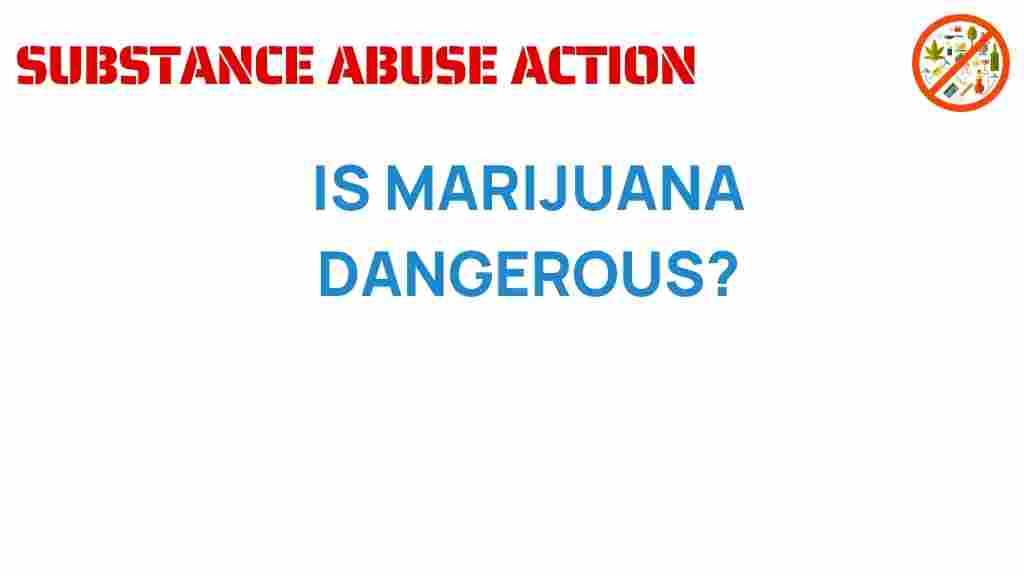Is Marijuana Dangerous? Understanding the Health Risks and Public Perception
Marijuana, often hailed as a miracle plant by some and vilified by others, has sparked a heated debate regarding its safety and health implications. With increasing legalization and acceptance in many parts of the world, it is crucial to navigate the landscape of marijuana, its health risks, and its impact on society. This article aims to unravel the myths and facts surrounding marijuana, focusing on addiction, mental health, and the broader public perception.
The Rise of Marijuana: A Historical Perspective
Marijuana has been used for thousands of years for various purposes, including medicinal and recreational uses. Its legality has fluctuated significantly:
- Ancient Use: Historical records indicate that marijuana was used in ancient Chinese medicine as early as 2737 BC.
- Prohibition Era: In the early 20th century, marijuana faced severe restrictions, leading to its criminalization in many countries.
- Legalization Movement: The late 20th and early 21st centuries saw a significant shift with various states and countries legalizing marijuana for medical and recreational use.
Understanding Marijuana: What is it?
Marijuana, also known as cannabis, contains over 100 chemical compounds called cannabinoids. The most well-known are:
- THC (Tetrahydrocannabinol): The psychoactive component that produces the “high.”
- CBD (Cannabidiol): Non-psychoactive and often touted for its potential therapeutic benefits.
As marijuana gains acceptance, understanding its health risks and potential for addiction becomes increasingly important.
Health Risks Associated with Marijuana
While marijuana may have therapeutic potential, it is essential to consider the health risks associated with its use. Here are some key areas of concern:
Addiction and Dependency
One of the most significant concerns surrounding marijuana is its potential for addiction. According to research, approximately 9% of users may develop a dependence on marijuana, with higher rates among those who start using in adolescence.
- Signs of Marijuana Addiction:
- Increased tolerance – needing more to achieve the same effects.
- Withdrawal symptoms – irritability, insomnia, and loss of appetite when not using.
- Continued use despite negative consequences in personal or professional life.
Mental Health Implications
The relationship between marijuana use and mental health is complex and multifaceted. Some studies suggest that marijuana can exacerbate existing mental health conditions, while others highlight its potential therapeutic effects. Key points include:
- Anxiety and Depression: Regular use may increase the risk of anxiety disorders and depression.
- Psychosis: High-potency strains can trigger or worsen psychotic disorders in susceptible individuals.
- Impact on Adolescents: Early use is linked to a higher risk of developing mental health issues later in life.
Physical Health Risks
Smoking marijuana can also pose various physical health risks:
- Respiratory Issues: Similar to tobacco smoke, marijuana smoke can irritate the lungs and lead to chronic bronchitis.
- Cardiovascular Effects: Marijuana can increase heart rate and may pose risks for individuals with heart conditions.
- Cognitive Impairment: Impaired memory and learning can occur, particularly in heavy users.
Public Perception of Marijuana
Public perception of marijuana has shifted dramatically over the years. Factors influencing this perception include:
- Legalization Trends: As more states and countries legalize marijuana, public opinion has become more favorable.
- Media Representation: Positive portrayals in media may contribute to a more accepting view of marijuana.
- Scientific Research: Growing research on the medicinal benefits of marijuana has changed perceptions among the public and policymakers.
Legalization and Its Impacts
The legalization of marijuana has brought about significant changes in various areas:
- Economic Benefits: Legalization has led to job creation and increased tax revenue for states.
- Public Health Approaches: Legal markets can regulate quality and safety, reducing risks associated with unregulated products.
- Decreased Criminalization: Legalization reduces the number of arrests related to marijuana possession, addressing social justice issues.
Treatment and Safety Considerations
For individuals struggling with marijuana use or addiction, treatment options are available. Here is a step-by-step guide to seeking help:
Step 1: Acknowledge the Problem
The first step towards recovery is acknowledging that marijuana use has become problematic. Signs may include:
- Inability to cut down on use.
- Neglecting responsibilities.
- Experiencing withdrawal symptoms.
Step 2: Seek Professional Help
Consulting with a healthcare provider or addiction specialist can provide guidance and support. Treatment options may include:
- Counseling: Cognitive-behavioral therapy (CBT) can help modify harmful thought patterns and behaviors.
- Support Groups: Joining groups like Marijuana Anonymous can offer community support.
- Medical Treatment: In some cases, medications may be prescribed to help manage withdrawal symptoms.
Troubleshooting Common Challenges
Recovering from marijuana addiction can be challenging. Here are some tips to help overcome common obstacles:
- Cravings: Find healthy distractions, such as exercise or hobbies.
- Triggers: Identify and avoid situations or environments that trigger the desire to use marijuana.
- Support System: Surround yourself with supportive friends and family who encourage your recovery.
Conclusion: Balancing Risks and Benefits
In conclusion, the question “Is marijuana dangerous?” does not have a straightforward answer. While marijuana has potential health risks, including addiction and mental health concerns, it also offers therapeutic benefits for some individuals. The shift in public perception and the movement towards legalization highlight the need for a balanced understanding of marijuana’s role in society.
As research continues to evolve, it is essential for individuals to stay informed about the health risks associated with marijuana use. Whether considering marijuana for medicinal purposes or recreational use, understanding the implications on health, addiction, and public perception is crucial for making informed decisions.
For additional resources on marijuana and its effects, you can explore the National Institute on Drug Abuse for comprehensive information. If you or someone you know is struggling with substance use, seeking help is vital, and there are many resources available.
This article is in the category Health and created by SubstanceAbuseAction Team
